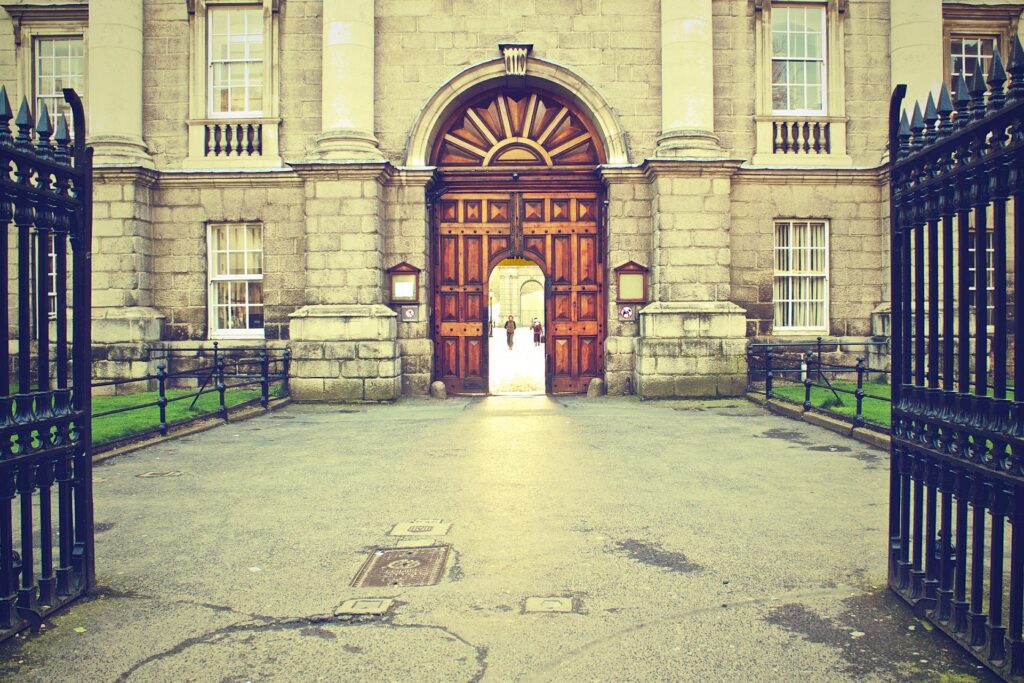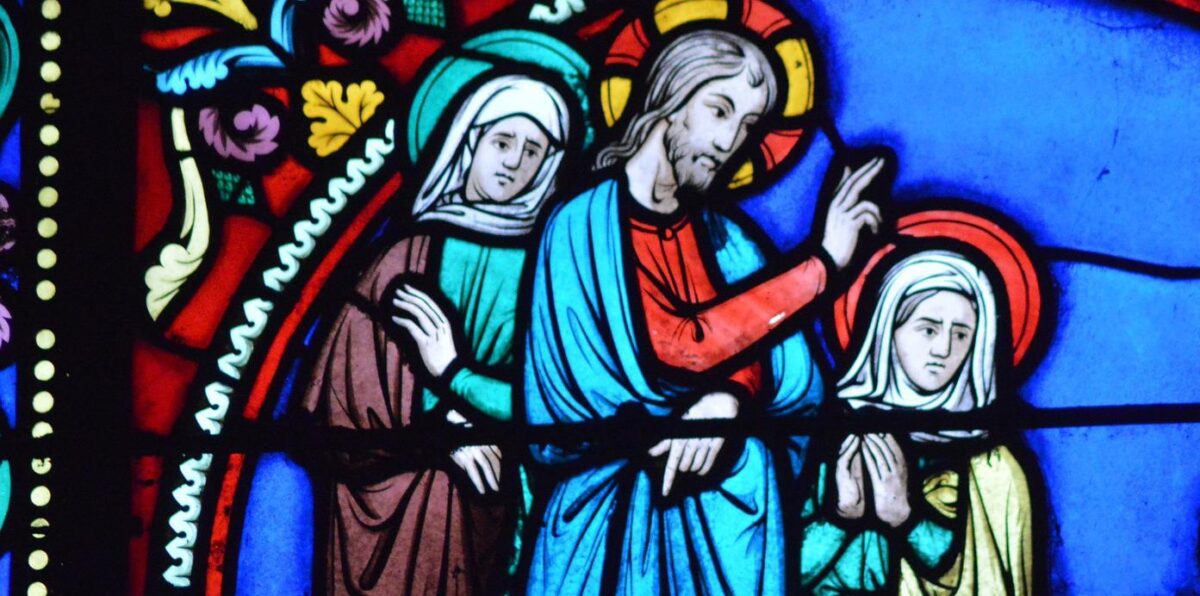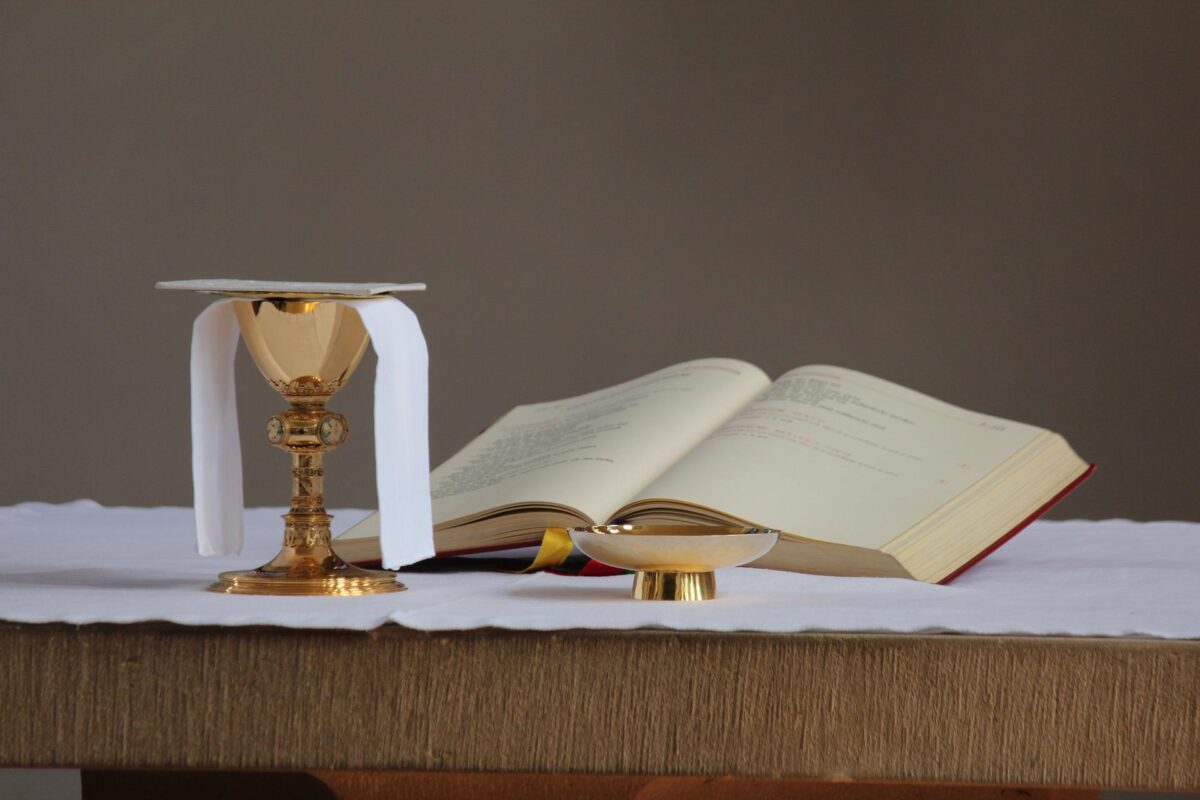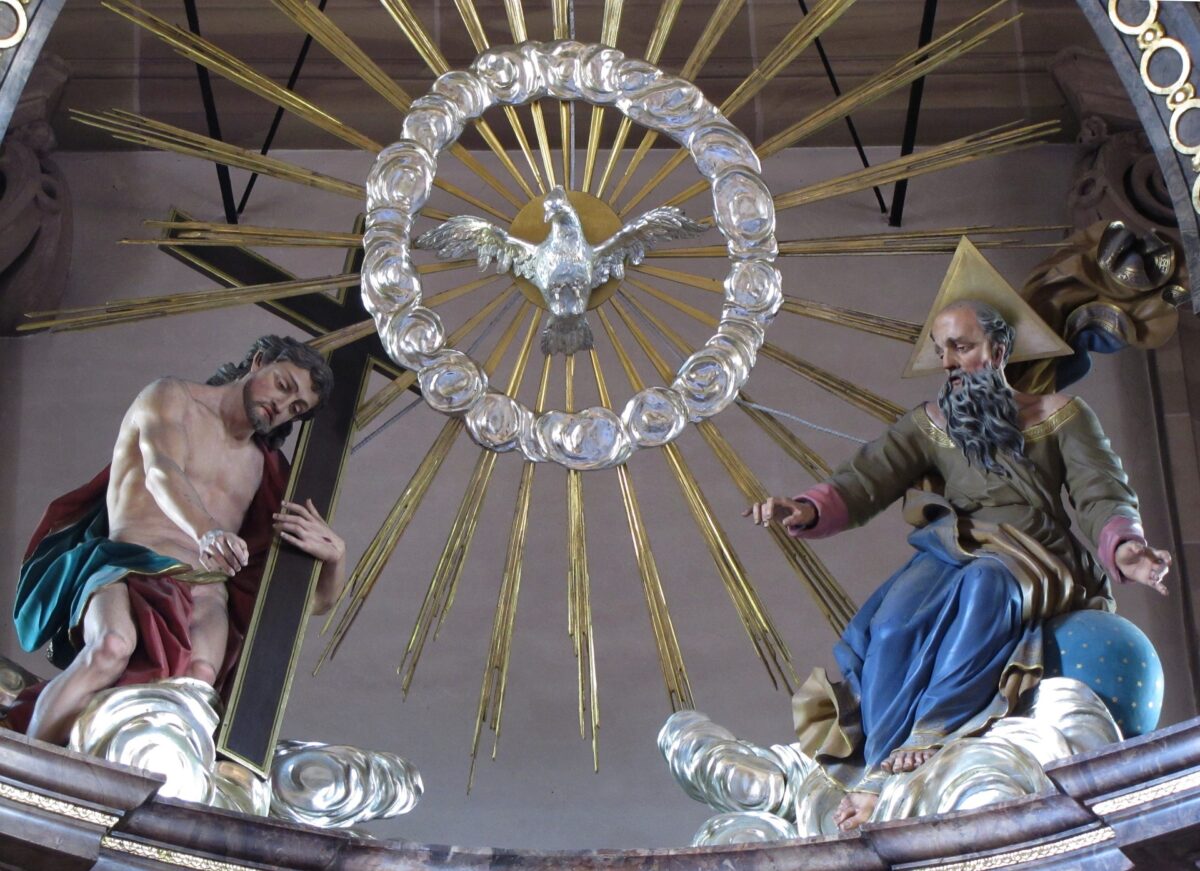By Deacon Richard Hay (First Homily after Ordination)
I don’t know about all of you, but this feels just a little different to be standing behind the ambo today at this particular time during the Mass this morning.
This time of course, is where we would normally hear the homily from either Fr. Mike or Fr. Sebastian on today’s gospel and the other readings. Today that is not changing, there is still a homily to be delivered and shared before we move on to participating in the Liturgy of the Eucharist on this Solemnity of the Most Blessed Holy Trinity.
Today though, the new guy gets to share what is hopefully some insight for all of us.
However, first there is a story to be told and it has been sitting up here in my head for the last four years or so just waiting for this day to arrive.
Here’s the inside scoop – this is not the first homily I have delivered from this ambo during a Mass at Sacred Heart. It’s true and some of you just might remember that day as well.
Shortly after being accepted as an aspirant for the Permanent Diaconate, I arrived here at the church for the Saturday Vigil Mass and was out in the narthex when Fr. Mike arrived – with barely any voice at all – full on laryngitis had left him literally speechless. He approached me and asked in a whisper if I would read his homily during the Mass. After the initial wave of anxiety passed, I answered yes and set to reading over the homily a few times.
Thankfully, everything went just fine and I didn’t do anything that got me kicked out of diaconate formation. I did know thought, that I would have a story to tell in a homily if God should bless me in the Sacrament of Holy Orders with ordination to the Permanent Diaconate. That blessing, as many of you can very clearly see with me standing here today before you vested a little differently, did arrive yesterday when Bishop Estevez ordained myself and six other men of our dioceses to the Permanent Diaconate for service in Christ’s church here in the Diocese of St. Augustine.
More on that later but as Fr. Rooney would often say, now a few thoughts about our scripture readings today.
According to the catechism, The Most Blessed Holy Trinity is considered one of the central mysteries of our Christian faith and life. It is called a divine mystery because it can never be fully understood unless that mystery is revealed by God himself. However, we have plenty of examples throughout scriptures and church teachings that show us that part of this beautiful mystery of the Most Holy Trinity is all about love and joy. The love and joy which the Father, and the Son, and the Holy Spirit has for us. The love and joy that we see between the Father and the Son is the Holy Spirit. That same Holy Spirit whose coming we celebrated last Sunday at Pentecost, that inspired the apostles to be bold and speak the truth of Christ after His resurrection, and that same Spirit is with us all today – it is the foundation of all love in the Holy Trinity. Three persons yet one God.
Multiple times in scripture, God the Father proclaims his love for his son Jesus.
If I asked you to recite the New Testament verse at John 3:16, I suspect many of you know that it says, “For God so loved the world that he gave his only son, so that everyone who believes in him might not perish but have eternal life.”
Another time we heard of the Father’s love for his son Jesus was at Christ’s baptism in the Jordan River by John the Baptist. After Jesus rises out of the water, a voice is heard from heaven saying, “This is my beloved Son, with whom I am well pleased.”
Then, when Jesus took Peter, James, and John up the mountain, Jesus was transfigured, and we learn that “…his face shone like the sun and his clothes became white as light.” and at this point we once again hear God the Father’s voice coming down from heaven saying, “This is my beloved Son, with whom I am well pleased…” just like at Jesus’s baptism but then he adds – “listen to him.”
Do we all listen to the Lord when he speaks to us? When he touches our heart with his unlimited love and joy, do we act on that love and joy or keep it to ourselves?
The love of our Lord and Savior Jesus Christ, the second person in our Most Holy Trinity, showed all of us the most ultimate sign of love – his sacrifice on the cross. When talking about being the true vine in John, Chapter 15, Jesus tells his disciples and us at the same time that – As the Father loves me, so I also love you. Remain in my love. If you keep my commandments, you will remain in my love, just as I have kept my Father’s commandments and remain in his love.
Right there we can see that Jesus’s relationship with his Father consists of the same type of love that Jesus asks us for – are we giving that level of love to Jesus each and every day in all that we do?
A little later in this same discourse about the vine and the branches, Jesus says that he has told us this so that his joy may be in us and that our joy may be complete.
Jesus wants nothing more than for us to carry his love and joy within us and then out into the world as we are the hands and feet of Christ in a society that desperately needs to see that love each and every day.
How do we keep that love fresh in us to carry out our task to proclaim Christ in the world? The sacraments can provide that beginning with the source and summit of our faith – the Holy Eucharist. We can begin by regularly receiving the Most Holy Body and Blood of Christ – his ultimate sacrifice of love which he gave us on the cross and we experience through the sacrifice on this altar at every Mass. When we receive the body, blood, soul, and divinity of Christ – when Jesus becomes part of us through the Eucharist – we can be filled to overflowing with his love and joy. It can fortify us to be sent forth from this place and allows us to head out into the world to proclaim the good news of his life, death, and resurrection – proclaiming it with love and joy for all to see through our actions – and sometimes you can use words too.
This brings us to the Holy Spirit, the Advocate, the Paraclete as Jesus described him just before ascending to the Father in heaven. Jesus told the apostles that the Holy Spirit that the Father will send in my name – he will teach you everything and remind you of all that I told you.
That means when we carry the Holy Spirit within us, which we received at our baptisms and again when we were sealed in the Holy Spirit at our confirmations, we can carry everything that Christ told us while he was on earth. All of the love, all of the joy that Christ feels for us is reinforced and strengthened through the Holy Spirit.
We heard proof of that strengthening of the Holy Spirit throughout the Easter Season as we read the Acts of the Apostles and saw how the apostles and other disciples of Christ were emboldened to speak the truth of God at all times and in all things. They were no longer scared of consequences for proclaiming the good news – they just knew that they must make this news known to the ends of the earth.
Are we carrying that strengthened and reinforced spirit within us as we proclaim the good news of Jesus to those in the world? Do we let the spirit move us and provide us with the words we need to speak?
As human beings, we long to be loved and what greater love is their than to be loved unconditionally by our God. It is unconditional because we do not have to do one thing to earn the love of God – it is there for us at all times – we just have to accept it and love God in return with all our hearts, all our souls, and with all our minds.
I would like to take just one more moment as I conclude and share something from the commentary I was studying while preparing this homily – it is a beautiful wrap-up on what the Most Blessed Holy Trinity is all about. The author writes:
We need God’s help to love others as Jesus loved us. To produce the fruits of love, we must remain on the vine and be pruned by the Father. Put differently, if we are to love others as God does, we need to remain and grow in communion with Jesus, through such things as prayer, the sacraments, and works of penance. Through these spiritual practices, we open ourselves to God’s action in us whereby we increasingly die to our own sinfulness and become conformed to the Father’s will. Thus, we will come to joyfully experience the Father’s love and be able to love others as he calls us to do.
So our mission this week is to carry the love that is shown to us in the Most Blessed Holy Trinity out into the world and impact the life of just one person. Share with them the love of God through one of the seven works of corporal mercy such as feeding the hungry, giving drink to the thirsty, clothing the naked, sheltering the homeless, and visiting the sick and imprisoned.
May the love we see in the Most Blessed Holy Trinity, embolden each one of us to change the world in one small way this week.
Today this, my first Mass as deacon at Sacred Heart, is one of thanksgiving for my call to the diaconate and my ordination yesterday. While I am the person standing up here in these vestments, there were all kinds of people involved over the six years of my formation and my years of discernment. Included in this list of people, there are many who might never know their impact and my resulting ordination to this ministry of service. Each and every one of them deserves thanks and they will forever be in my prayers.
While I can’t stand up here and thank everyone else individually and would likely miss so many people, allow me to say a simple thank you to Margo for all her care and support throughout this process, the long nights and weekends of me studying, reading and attending classes in these six years of formation. She has been my rock in our 38 years together – I love you Margo. Someone else attending this Mass today is Deacon Paul Testa from Mary Queen of Heaven who has been my mentor over these last three years and is now someone I can call a lifelong friend and now a brother deacon. Thanks Deacon Paul.
Here at Sacred Heart, so many of you have been praying for and encouraging me as I travelled on this journey – including some very intense prayer for me to be assigned here at Sacred Heart. We now know this is where Bishop Estevez has decided to allow me to begin my ministry as a deacon. Thank you all so very much – you all will continue to be in my prayers.
By the way, I know it isn’t a contest or anything like that, but Sacred Heart attendees at the Ordination Mass yesterday easily outnumbered other parishes by a factor of at least two – maybe three. Thanks for making that effort to be part of a very blessed day for me, my family, and of course our parish.
Finally – to Fr. Mike and Fr. Sebastian – your pastoral and liturgical mentorship has been a blessing. I have enjoyed learning from both of you and I look forward to continuing those relationships in service to the Sacred Heart community.
Deacons have a unique role in the church because we have one foot in the secular world with our lives involving family, children, and our careers and then we have another foot here in the sacred of our church because of our ordination which configures us to Christ as his servants to all the people of God.
It is a role I cherish and am blessed to have received. I look forward to sharing this journey with all of you.
Please continue to pray for all of us here at Sacred Heart that we are people who carry the love of Christ from within this sacred place and out into the world.
Thanks.






